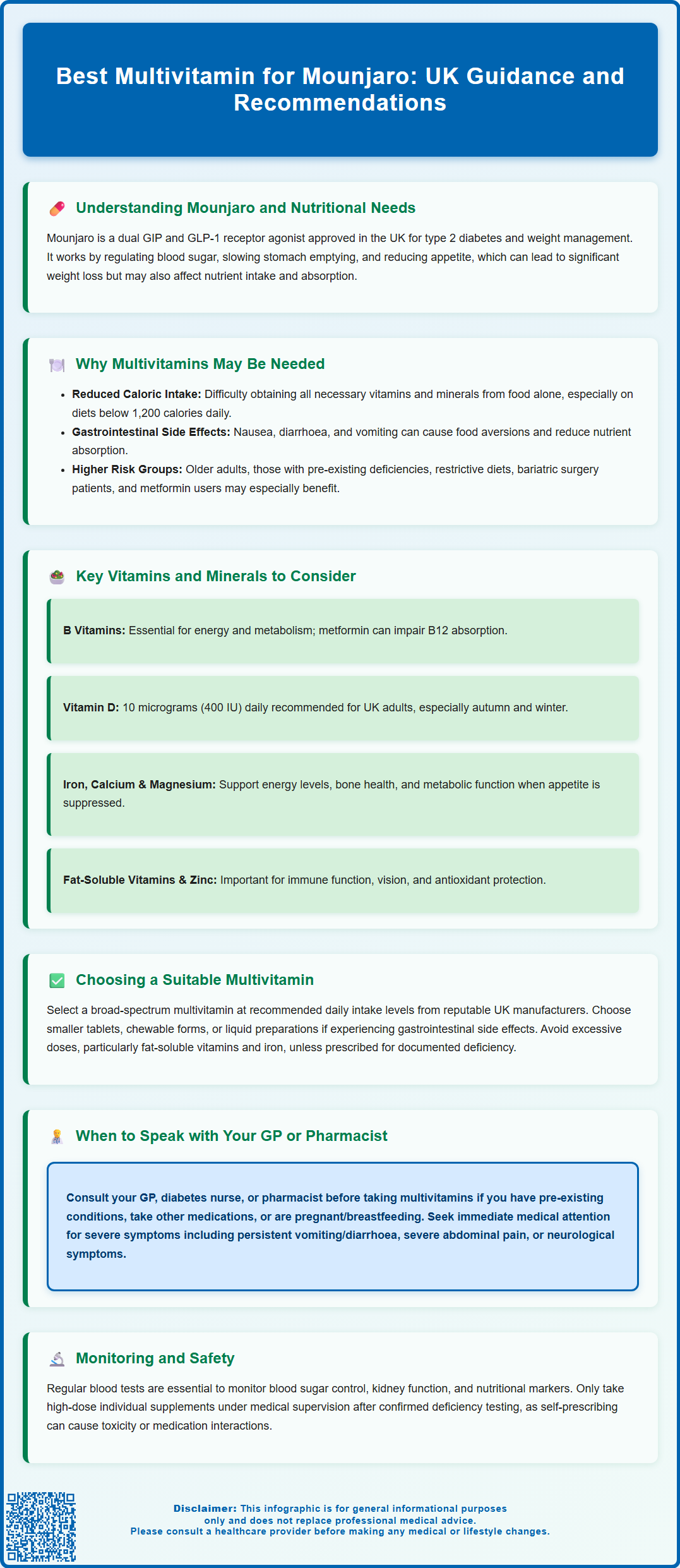Mounjaro (tirzepatide) is a prescription medicine licensed in the UK for type 2 diabetes and weight management in adults with obesity or overweight with weight-related comorbidities. Whilst highly effective, Mounjaro's appetite-suppressing effects and gastrointestinal side effects can reduce food intake and alter eating patterns, potentially creating nutritional gaps. Many patients wonder whether multivitamin supplementation is necessary during treatment. This article examines the relationship between Mounjaro and nutritional needs, explores key vitamins and minerals to consider, and provides guidance on selecting appropriate supplementation whilst prioritising a food-first approach under healthcare professional supervision.
Summary: There is no single 'best' multivitamin universally recommended for Mounjaro users, but a comprehensive formulation providing essential vitamins and minerals at Reference Nutrient Intake levels may help bridge nutritional gaps caused by reduced food intake.
- Mounjaro (tirzepatide) is a dual GIP and GLP-1 receptor agonist licensed in the UK for type 2 diabetes and weight management
- The medication's appetite suppression and delayed gastric emptying can reduce food intake and affect nutrient absorption
- Key nutrients to consider include B vitamins (especially B12), vitamin D, iron, calcium, magnesium, and fat-soluble vitamins
- No official evidence suggests Mounjaro directly depletes specific vitamins, but reduced dietary intake creates practical nutritional concerns
- Multivitamin supplementation should complement a food-first approach and be discussed with healthcare professionals, particularly for those with pre-existing conditions or taking other medications
Table of Contents
Understanding Mounjaro and Nutritional Needs
Mounjaro (tirzepatide) is a prescription medicine licensed in the UK for the treatment of type 2 diabetes mellitus and, more recently, for weight management in adults with obesity or overweight with weight-related comorbidities. It should be used as an adjunct to a reduced-calorie diet and increased physical activity. Mounjaro belongs to a class of medications known as dual glucose-dependent insulinotropic polypeptide (GIP) and glucagon-like peptide-1 (GLP-1) receptor agonists. By mimicking these naturally occurring hormones, Mounjaro helps regulate blood sugar levels, slows gastric emptying, and reduces appetite, which can lead to significant weight loss.
Whilst Mounjaro offers considerable therapeutic benefits, its mechanism of action can influence dietary intake and nutritional status. The medication's effect on appetite suppression and delayed gastric emptying often results in reduced food consumption and altered eating patterns. Many patients report feeling fuller for longer periods and experiencing decreased interest in food, which may inadvertently lead to lower overall calorie and nutrient intake.
Additionally, some individuals taking Mounjaro experience gastrointestinal side effects such as nausea, vomiting, diarrhoea, or constipation, particularly during the initial weeks of treatment or following dose escalations. These symptoms can further compromise nutritional intake, potentially creating gaps in essential vitamin and mineral consumption.
It is important to note that Mounjaro's delayed gastric emptying effect may affect the absorption of some oral medicines, including oral contraceptives. If you use oral contraceptive pills, you may need additional contraceptive measures for 4 weeks after starting Mounjaro and after each dose increase. Always discuss this with your healthcare provider.
Whilst Mounjaro can be highly effective, it should always be used as part of a comprehensive treatment plan that includes dietary modifications, physical activity, and regular medical monitoring to ensure both therapeutic efficacy and nutritional adequacy.

Why Multivitamins May Be Needed with Mounjaro
The need for multivitamin supplementation whilst taking Mounjaro arises primarily from its effects on eating behaviour and gastrointestinal function. Reduced caloric intake, whilst beneficial for weight management and glycaemic control, can make it challenging to obtain the full spectrum of vitamins and minerals required for optimal health through diet alone. When food consumption decreases significantly, even a well-balanced diet may fall short of meeting recommended daily nutrient intakes.
A food-first approach should always be prioritised, focusing on nutrient-dense foods to maximise nutritional value within a reduced calorie intake. However, for some individuals, supplementation may be appropriate to bridge nutritional gaps. This is particularly relevant if you're following a very low-calorie diet (less than 1,200 calories daily), which should only be undertaken with healthcare professional or dietitian oversight.
Gastrointestinal symptoms associated with Mounjaro can further complicate nutritional status. Persistent nausea may lead to food aversions, particularly towards nutrient-dense foods such as meat, fish, or vegetables. Frequent or prolonged diarrhoea or vomiting can affect nutrient intake and utilisation. These effects are typically most pronounced during treatment initiation and dose titration, though some patients experience ongoing symptoms.
There is no official link established by the MHRA or manufacturer suggesting that Mounjaro directly depletes specific vitamins or minerals through a pharmacological mechanism. However, the indirect effects on dietary intake and gastrointestinal tolerance create a practical concern for nutritional adequacy.
Certain populations may have heightened vulnerability, including older adults, those with pre-existing nutritional deficiencies, individuals with restrictive dietary patterns (vegetarian, vegan, or food intolerances), patients with a history of bariatric surgery, and those taking metformin (which can reduce vitamin B12 levels over time). For these groups, proactive nutritional support through multivitamin supplementation may be particularly important to prevent deficiency-related complications whilst benefiting from Mounjaro therapy.
Key Vitamins and Minerals to Consider
When selecting a multivitamin to support nutritional needs during Mounjaro treatment, several key micronutrients warrant particular attention due to their roles in metabolism, immune function, and overall wellbeing.
B vitamins (particularly B12, B6, folate, and thiamine) are essential for energy metabolism, nervous system function, and red blood cell formation. Reduced intake of animal products, whole grains, and fortified foods—common when appetite is suppressed—can compromise B vitamin status. Vitamin B12 deficiency is especially relevant for those with diabetes, as metformin (often co-prescribed) can impair its absorption. The MHRA advises that patients on long-term metformin should be monitored for B12 deficiency.
Vitamin D is crucial for bone health, immune function, and may play a role in glucose metabolism. Many UK residents have suboptimal vitamin D levels, particularly during autumn and winter months. The NHS recommends that adults consider taking 10 micrograms (400 IU) of vitamin D daily, though higher doses may be appropriate for those with documented deficiency. The UK safe upper limit for vitamin D is 100 micrograms (4,000 IU) per day.
Iron supports oxygen transport and energy levels. Reduced consumption of red meat and iron-rich foods may increase deficiency risk, particularly in menstruating women.
Calcium and magnesium are vital for bone health, muscle function, and metabolic processes. Decreased dairy intake can affect calcium status.
Zinc supports immune function and wound healing. Ensuring adequate zinc intake is important for overall health during weight loss.
Fat-soluble vitamins (A, E, and K) require dietary fat for absorption. With reduced food intake, ensuring adequate intake of these vitamins becomes important for vision, antioxidant protection, and blood clotting respectively.
Important safety notes:
-
Vitamin B6 supplements should not exceed 10 mg daily (unless prescribed) to avoid risk of peripheral neuropathy
-
If you are pregnant or planning pregnancy, avoid vitamin A (retinol) supplements and liver products, and note that Mounjaro is not recommended during pregnancy or breastfeeding
-
Prolonged or severe gastrointestinal symptoms warrant medical review rather than self-supplementation
Choosing a Suitable Multivitamin While Taking Mounjaro
Selecting an appropriate multivitamin whilst taking Mounjaro requires consideration of several practical and clinical factors to ensure both safety and efficacy.
Comprehensive formulation: Look for a multivitamin that provides a broad spectrum of essential vitamins and minerals at levels close to the Reference Nutrient Intakes (RNIs) or Nutrient Reference Values (NRVs) established for the UK population. Products specifically formulated for adults may be suitable, though there is no single "best" multivitamin universally recommended for Mounjaro users. Be cautious with products marketed specifically for weight management, as these may contain additional stimulants or botanical ingredients with limited evidence.
Dosage and tolerability: Given the gastrointestinal sensitivity that many Mounjaro users experience, consider the size and number of tablets or capsules required. Some individuals find smaller tablets, chewable formulations, or liquid preparations easier to tolerate. Taking multivitamins with food (even a small amount) can reduce nausea, though this should be balanced against the appetite-suppressing effects of Mounjaro.
Quality and regulation: In the UK, food supplements including multivitamins are regulated as foods rather than medicines. Choose products from reputable manufacturers that follow good manufacturing practices. Look for products that display clear ingredient lists, appropriate dosages, and batch numbers. Whilst not mandatory, some products carry voluntary certification marks indicating quality testing.
Avoid excessive doses: More is not necessarily better when it comes to vitamins and minerals. Excessive intake of certain nutrients (particularly fat-soluble vitamins A, D, E, and K, as well as iron) can cause toxicity. Unless specifically advised by your healthcare provider to take higher therapeutic doses for documented deficiency, standard multivitamin formulations are generally appropriate.
Timing considerations: While there is no specific interaction between Mounjaro and multivitamins, Mounjaro's effect on delaying gastric emptying may affect the absorption of some medications. If you take medications with critical absorption timing (such as oral contraceptives, thyroid medications, or antibiotics), consult your pharmacist about appropriate spacing. For most people, taking your multivitamin at a consistent time when you typically feel least nauseous may improve adherence and tolerability.
When to Speak with Your GP or Pharmacist
Whilst multivitamin supplementation is generally considered safe for most individuals taking Mounjaro, there are several circumstances when professional guidance is essential before starting or continuing supplementation.
Before starting any supplement, discuss your plans with your GP, diabetes specialist nurse, or pharmacist, particularly if you have:
-
Pre-existing medical conditions (kidney disease, liver disease, or malabsorption disorders)
-
A history of kidney stones or hypercalcaemia
-
Other prescribed medications that may interact with certain vitamins or minerals
-
Known allergies to supplement ingredients
-
Are using oral contraceptives (additional contraception may be needed for 4 weeks after starting Mounjaro and after each dose increase)
-
Are pregnant, breastfeeding, or planning pregnancy (Mounjaro is not recommended during pregnancy or breastfeeding)
Seek medical advice promptly if you experience:
-
Persistent or severe gastrointestinal symptoms (vomiting, diarrhoea, or abdominal pain) that prevent adequate food or fluid intake
-
Severe, persistent abdominal pain, especially if radiating to the back (possible pancreatitis)
-
Right upper abdominal pain, fever, or yellowing of the skin/eyes (possible gallbladder disease)
-
Signs of potential nutritional deficiency, such as unusual fatigue, weakness, hair loss, brittle nails, mouth ulcers, or neurological symptoms (tingling, numbness)
-
Unexplained weight loss exceeding clinical targets or loss of muscle mass
-
Difficulty maintaining blood glucose control
Regular monitoring is important for anyone taking Mounjaro. Your healthcare team should conduct periodic blood tests to assess glycaemic control, kidney function, and potentially nutritional markers (such as vitamin B12, vitamin D, iron studies, or full blood count) based on your individual risk factors and symptoms.
If you are considering high-dose supplementation of individual vitamins or minerals beyond standard multivitamin levels, this should only be undertaken under medical supervision following appropriate testing to confirm deficiency. Self-prescribing high doses can lead to imbalances, toxicity, or interference with medications.
Your pharmacist can provide valuable advice on suitable multivitamin products, potential interactions with your other medications, and appropriate timing of supplementation. They can also help identify symptoms that warrant medical review rather than self-management with supplements alone.
If you experience any suspected side effects from Mounjaro, report them via the MHRA Yellow Card scheme (yellowcard.mhra.gov.uk or via the Yellow Card app).
Frequently Asked Questions
Do I need to take a multivitamin whilst on Mounjaro?
Whilst not mandatory, a multivitamin may help bridge nutritional gaps if Mounjaro's appetite-suppressing effects significantly reduce your food intake, particularly if you're consuming fewer than 1,200 calories daily. Always prioritise nutrient-dense foods and discuss supplementation with your healthcare provider.
Which vitamins are most important when taking Mounjaro?
B vitamins (especially B12), vitamin D, iron, calcium, magnesium, and fat-soluble vitamins (A, E, K) are particularly important, as reduced food intake may compromise their consumption. Vitamin B12 is especially relevant if you also take metformin.
Can I take any multivitamin with Mounjaro, or are there specific requirements?
Choose a comprehensive multivitamin from a reputable manufacturer that provides nutrients at Reference Nutrient Intake levels, avoiding excessive doses. Consider formulations that are easy to tolerate given potential gastrointestinal sensitivity, and always discuss with your GP or pharmacist before starting supplementation.
The health-related content published on this site is based on credible scientific sources and is periodically reviewed to ensure accuracy and relevance. Although we aim to reflect the most current medical knowledge, the material is meant for general education and awareness only.
The information on this site is not a substitute for professional medical advice. For any health concerns, please speak with a qualified medical professional. By using this information, you acknowledge responsibility for any decisions made and understand we are not liable for any consequences that may result.
Heading 1
Heading 2
Heading 3
Heading 4
Heading 5
Heading 6
Lorem ipsum dolor sit amet, consectetur adipiscing elit, sed do eiusmod tempor incididunt ut labore et dolore magna aliqua. Ut enim ad minim veniam, quis nostrud exercitation ullamco laboris nisi ut aliquip ex ea commodo consequat. Duis aute irure dolor in reprehenderit in voluptate velit esse cillum dolore eu fugiat nulla pariatur.
Block quote
Ordered list
- Item 1
- Item 2
- Item 3
Unordered list
- Item A
- Item B
- Item C
Bold text
Emphasis
Superscript
Subscript










